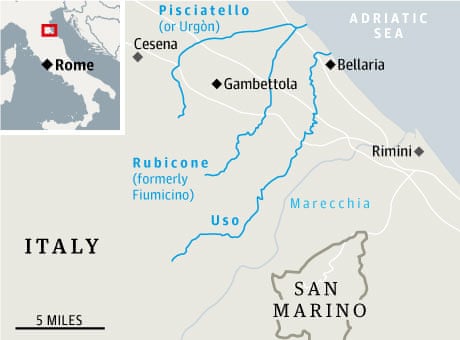The Rubicon and Julius Caesar.
Until recently the location of the Rubicon wasn’t clear, but now it’s been identified as what was previously known as the Fiumicino river. In the period of the late Republic it marked the southern boundary of Cisalpine Gaul, a province. Anyone crossing it was now within the direct control of Rome and this is the crux of the matter. If you were a general or someone in charge of an army you were required to halt them prior to the river. You could cross it but not as someone in charge of an army. To do so would be akin to marching on Rome. Consequences could be grave.
For more info on the river check out this post on the excellent Following Hadrian blog.
January 49 BC and the Rubicon.
Tensions between the Roman Senate and a general named Julius Caesar had been growing for some time. Caesar’s main concern was that by returning to Rome he would be placed back into a political dogfight without his main asset, his army. Caesar knew that he would be likely face prosecution so he faced a conundrum. Play the game and hope that he could beat the trap or take his army south as insurance. Our two main sources, Suetonius and Plutarch, paint Caesar as a man who understood the weight of his next action. Plutarch has him agonising whilst Suetonius, in true fashion, also has him pondering but then inspired by a very unlikely event.[1]
As Caesar stood in two minds an apparition of superhuman size and beauty was seen sitting on the river bank playing a reed pipe. A party of shepherds gathered around to listen and when some of Caesar’s men, including some of the trumpeters, broke ranks to do the same, the apparition snatched a trumpet from one of them, ran down to the river, blew a thunderous blast, and crossed over. Caesar exclaimed “Let us accept this as a sign from the Gods and follow where they beckon, in vengeance on our double-dealing enemies. The die is cast”.[2]
Here Caesar’s decision is made easier in the form of an omen, not an uncommon event in Roman history, often occurring at important moments. This was certainly one of them, so it suits the narrative that the event be marked by divine guidance. The addition of shepherds is both practical, from a narrative perspective, after all what other group would be in attendance. However, there might also be a continuation of a pattern here, as shepherds were an important part of the Romulus and Remus myth. It was a shepherd who found them, the twins became shepherds, and shepherds were involved in the twins avenging Numitor and beginning the process by which they would end up at loggerheads.
Playing games.
According to Plutarch Caesar uttered the phrase “Let the die be cast” whereas Suetonius reported that Caesar said “the die is cast”. Both were quoting a line from the Greek comedic playwright Menander (342-290 BC).
“Ἀνερρίφθω κύβος” “Let the die be cast”. (Latin Alea iacta esto)
Suetonius seems to have translated incorrectly from the Greek into Latin, but I’m not one to point fingers, if anything it’s good to know that historians back then were also human. This might seem as if Caesar was choosing a highbrow and obscure line. However, as Plutarch noted, it was a common saying used when you were about to embark on a risky or hazardous venture. Plutarch also added that Caesar spoke it in the original Greek, which would make sense if you were quoting from a play.[3]
The use of a familiar term across the lower social classes is a nice touch and perhaps not an unexpected one. Caesar was a fantastic communicator and understood how to appeal to the average Roman.
Not one to pour cold water on such a wonderfully framed moment, but only Plutarch and Suetonius mention the crossing of the Rubicon with the quote. The likes of Livy and Cicero as well as other sources don’t mention it.
There’s an irony here to appreciate. A saying at a momentous event which was an idiom at the time has borne another. ‘Crossing the Rubicon’ is what Caesar did after quoting the line from Menander and nowadays this has itself become a term used when an irreversible decision has been made and a person is past the point of no return. History not so much repeating itself but somewhere close.
You may also like
Archives
Calendar
| M | T | W | T | F | S | S |
|---|---|---|---|---|---|---|
| 1 | 2 | 3 | 4 | 5 | ||
| 6 | 7 | 8 | 9 | 10 | 11 | 12 |
| 13 | 14 | 15 | 16 | 17 | 18 | 19 |
| 20 | 21 | 22 | 23 | 24 | 25 | 26 |
| 27 | 28 | 29 | 30 | 31 | ||

Leave a Reply